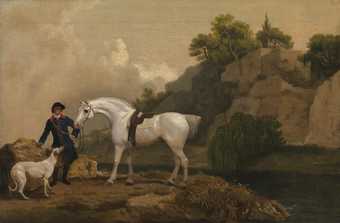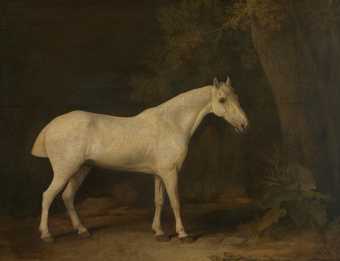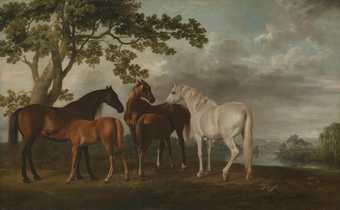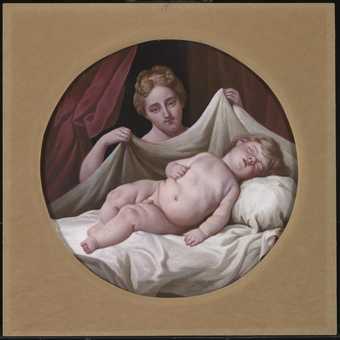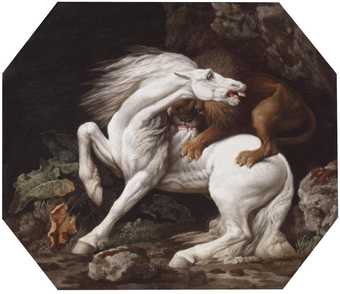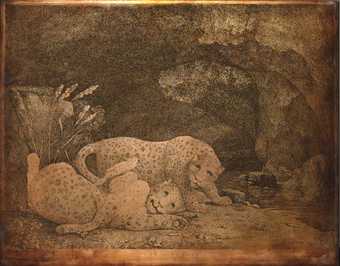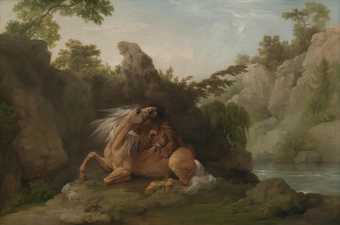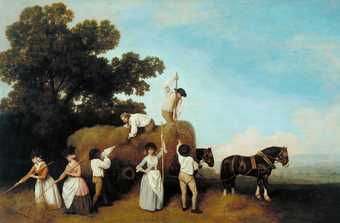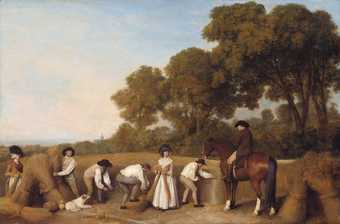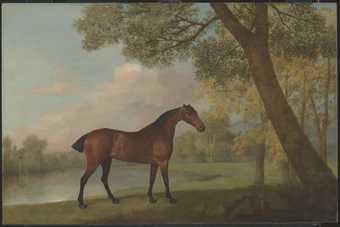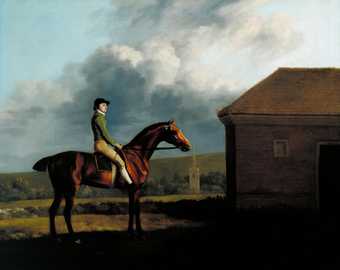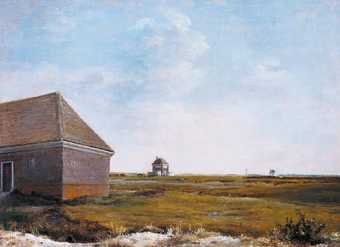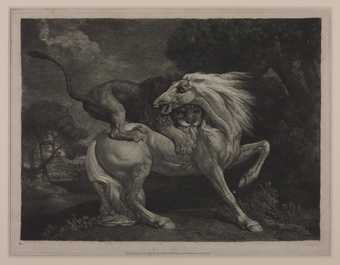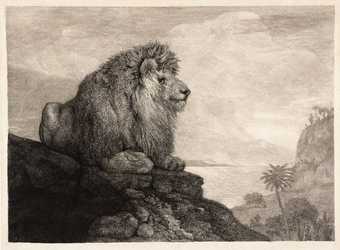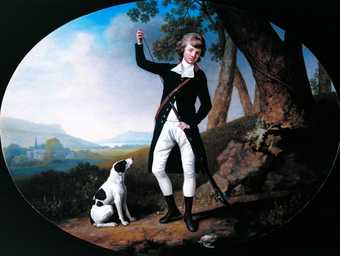
In Tate Britain
- Artist
- George Stubbs 1724–1806
- Medium
- Oil paint on canvas
- Dimensions
- Unconfirmed: 705 × 1019 mm
frame: 885 × 1208 × 85 mm - Collection
- Tate
- Acquisition
- Purchased with assistance from the National Heritage Memorial Fund, the Art Fund and the Friends of the Tate Gallery 1994
- Reference
- T06869
Summary
The dramatic theme of a lion attacking a horse is one of the most important in Stubbs's art and one which preoccupied him for over thirty years. It admirably combined his legendary anatomical precision as an animal painter with the heroic action, drama and sentiment required of the elevated genre of History Painting.
The original inspiration for the theme seems to have been a famous antique sculpture, the Capitoline group of a lion devouring a horse, which Stubbs probably saw on his visit to Rome in 1754. From the marble's initial inspiration Stubbs developed the theme by making it episodic, imagining the scenes which must have preceded the horse's inevitable death. In about eighteen works in various media - including oils, enamels, engravings and relief models - he depicted the horse first scenting the lion's approach, then recoiling from the confrontation, then agonised as the lion leaps upon its back and, finally, in the fourth episode, devoured by the lion. This painting represents the earliest stage of the terrifying encounter as the horse scents the emergence of the lion from its cave and rises up in fright.
It was this version of A Horse Frightened by a Lion which Stubbs chose to adapt for engraving in 1777. The subject was a very popular one and in 1780 Stubbs used the same composition to model a clay bas-relief from which the pottery manufacturer Josiah Wedgwood produced decorative black basalt tablets.
In order to create a convincing portrayal of the animals in his 'Horse and Lion' subjects, Stubbs made numerous studies of a lion in Lord Shelburne's menagerie at Hounslow Heath, while the horse had earlier been the subject of meticulous scientific observation by the artist. In these works, Stubbs wholly departs from the restrained portraiture of well-bred animals to echo the more sublime emotions of Romanticism: terror, anguish and the throes of death. The Romantic mood is enhanced by the wild landscape setting that Stubbs chose - the dramatic rock formations of Creswell Crags, on the Nottinghamshire-Derbyshire border. The looming limestone crags are made to work in conjunction with the emotionally-charged combat between the two noble beasts. In this composition, the horse's head, still free, is outlined against an open sky, while in later episodes the animals are engulfed in the dark mass of the rocks, as the horse succumbs to its fate.
The painting is one of a pair with Horse Devoured by a Lion, acquired by Tate in 1976. They were almost certainly the pictures exhibited as companions at the Society of Artists in 1763. The pair appear to be Stubbs's first fully developed essay on the 'Lion and Horse' theme and the earliest to be exhibited. Horace Walpole (1717-97), the great eighteenth-century writer and critic, was so impressed by the picture that he composed a poem 'On seeing the celebrated Startled Horse, painted by the inimitable Mr. Stubbs' which paints a vivid word-picture of the frightened horse, 'rooted' to the spot by 'apprehension, horror, hatred, fear', with 'ears shot forward' and 'stiff projected mane'. The pictures make narrative as well as visual sense as a pair, for they show the first and last episodes in the fatal attack by the lion on the horse.
Further Reading
Basil Taylor 'George Stubbs, "The Lion and Horse" Theme', Burlington Magazine, vol. 108, February 1965, pp. 81-6 and appendix no.9
Basil Taylor Stubbs, London 1971, p.34
Judy Egerton, George Stubbs 1724-1806, exhibition catalogue, Tate Gallery, 1984, cat. 62, reproduced p.94 (colour)
Illustrated Catalogue of Acquisitions 1976-8 Tate Gallery, 1979, pp. 16-17
Diane Perkins
March 2001
Does this text contain inaccurate information or language that you feel we should improve or change? We would like to hear from you.
Display caption
The dramatic theme of a lion attacking a horse preoccupied Stubbs for over thirty years. This painting comes from a series of four episodes in a terrifying attack on a passive horse. This is the first stage, as the horse scents the lion emerging from its cave and rises up in fright. The setting for this violent encounter is the harsh, rocky landscape of Creswell Crags in the Peak District. The area was then an inaccessible, wild region that fascinated Stubbs. The scenery makes a suitably romantic background for the ‘sublime’ drama of the scene.
Gallery label, February 2016
Does this text contain inaccurate information or language that you feel we should improve or change? We would like to hear from you.
Explore
- emotions, concepts and ideas(16,416)
-
- emotions and human qualities(5,345)
-
- fear(262)
- UK counties(19,585)
-
- Derbyshire(223)
- England(19,202)
- England, Midlands(1,861)
You might like
-
George Stubbs A Grey Hunter with a Groom and a Greyhound at Creswell Crags
c.1762–4 -
George Stubbs Horse in the Shade of a Wood
1780 -
George Stubbs Mares and Foals in a River Landscape
c.1763–8 -
George Stubbs Mother and Child
1774 -
George Stubbs Horse Attacked by a Lion
1769 -
George Stubbs Leopards at Play
1780 -
George Stubbs Horse Devoured by a Lion
?exhibited 1763 -
George Stubbs Haymakers
1785 -
George Stubbs Reapers
1785 -
George Stubbs Bay Hunter by a Lake
1787 -
George Stubbs Otho, with John Larkin up
1768 -
George Stubbs Newmarket Heath, with a Rubbing-Down House
c.1765 -
George Stubbs A Horse Attacked by a Lion (A Lion Devouring a Horse)
published 1788 -
George Stubbs A Lion Resting on a Rock
published 1788 -
George Stubbs Portrait of a Young Gentleman Out Shooting
1781

